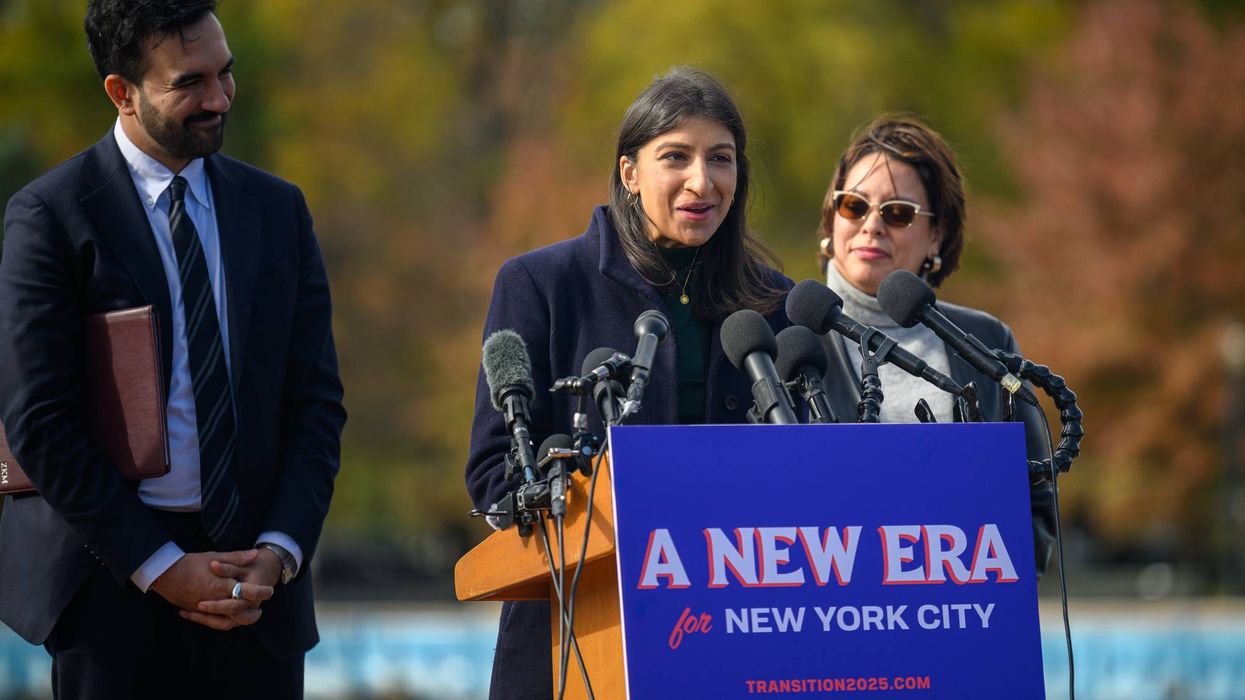December, 29 2016, 03:30pm EDT
NAACP Calls on Senate to Block Sessions for Attorney General
Historic and current failure to acknowledge voter suppression remains a key issue
BALTIMORE, MD.
NAACP President and CEO Cornell William Brooks issued the following statement opposing the nomination of Senator Jeff Sessions as potential Attorney General:
"America yet stands at the beginning of presidential administration but also in the middle of a Twitter age civil rights movement based on old divisions. Senator Jefferson Beauregard Sessions is among the worst possible nominees to serve as Attorney General amidst some of the worst times for civil rights in recent memory.
"Following a divisive presidential campaign, hate crimes rising, police videos sickening the stomach while quickening the conscience, protesters marching in the streets and politicians mouthing the myth of voter fraud while denying the reality of voter suppression, Senator Sessions is precisely the wrong man to lead the Justice Department. The NAACP, as the nation's oldest and largest civil rights organization, opposes the nomination of Senator Sessions to become U.S. Attorney General for the following reasons: a record on voting rights that is unreliable at best and hostile at worse; a failing record on other civil rights; a record of racially offensive remarks and behavior; and dismal record on criminal justice reform issues."
Voting Rights:
Senator Sessions supported the re-authorization of the 1965 Voting Rights Act in 2006, but called the bill "a piece of intrusive legislation" just months earlier. Sessions has consistently voted in favor of strict voter ID laws that place extra burdens on the poor and residents of color, and drive voter suppression across the country. When the Supreme Court struck down federal protections in 2012 that prevented thousands of discriminatory state laws from taking effect since 1965, Sessions declared it was "a good thing for the South." As a prosecutor in 1985, Sessions maliciously prosecuted a former aide to Martin Luther King for helping senior citizens file absentee ballots in Alabama.
Rather than enforcing voting rights protections, Senator Sessions has instead made a career of seeking to dismantle them. When Shelby County v. Holder gutted the protections of the VRA, Senator Sessions cheered. For decades, he has pursued the rare and mystical unicorn of voter fraud, while turning a blind eye to the ever-growing issue of voter suppression.
While Senator Sessions' historical record on civil rights remains one of dismay, it is his unrepentant stance against the vote that remains our issue. The threat of voter suppression is not a historical but current challenge. At least 10 times in the past 10 months, the NAACP defended voting rights against coordinated campaigns by legislators targeting African-American voters in Texas, North Carolina, Wisconsin, and many other states.
While the NAACP could gain the assistance of the Justice Department in fighting back against voter suppression, a Sessions-led DOJ would likely lead to the exact opposite. During the height of the Civil Rights Movement, then-Attorney General Nicholas Katzenbach's commitment to democracy allowed him to help write the VRA. Today, our nation stands on the verge of selecting an AG who has never shown the slightest commitment to enforcing the protections Katzenbach and others wrote into law.
How can our communities who have born the both historical and current brunt of the attacks on the right to vote, sit idly by while an enemy to the vote is now given the responsibility of enforcing this right? The simple answer is that we can't.
Other Civil Rights:
Since 1997, Senator Sessions has received an F every year on the NAACP's federal legislative civil rights report cards. He's voted against our policy positions nearly 90 percent of the time. Senator Sessions has repeatedly supported lawsuits and attempts to overturn desegregation while shamelessly voting against federal Hate Crime legislation four times from 2000 to 2009.
Notwithstanding, he has also repeatedly voted against the Violence Against Women Act that expanded protection for victims of domestic violence and repeatedly stood on the wrong side of immigration and LGBT issues.
Racial Insensitivity:
During his failed 1986 federal judgeship hearing, four DOJ attorneys and colleagues of Senator Sessions testified that he made several racist statements. J. Gerald Hebert testified that Sessions had referred to the National Association for the Advancement of Colored People (NAACP) and the American Civil Liberties Union (ACLU) as "un-American" and "Communist inspired" because they "forced civil rights down the throats of people.
Additional accusations of racist behavior were attributed to Senator Sessions by Thomas Figures, an African American Assistant U.S. Attorney, who testified that Sessions said he thought the Ku Klux Klan was "OK until I found out they smoked pot." Sessions later said that the comment was not serious, but did apologize for it. Mr. Figures also testified that on one occasion, Senator Session railed against civil rights cases, threw a file on the table and called him the derogatory racist term "boy," and later advised Figures to watch what he said to white people.
Criminal Justice Reform:
In a time of expanding protests against the scourge of police brutality, Senator Sessions stands on opposite ground. He has repeated stood against the consent decree, a main tool of the DOJ to reel in racist and unaccountable police departments. In a report by the Alabama Policy Institute, Senator Sessions called consent decrees: "One of the most dangerous, and rarely discussed, exercises of raw power is the issuance of expansive court decrees. Consent decrees have a profound effect on our legal system as they constitute an end run around the democratic process."
While under the administration of President Barack Obama, the DOJ's Civil Rights Division made investigating police departments charged with racism and police brutality a key focus by intervening in high-profile cases in Ferguson, Missouri and Baltimore, Maryland to impose consent decrees and reforms to correct misbehavior and the violation of citizen's civil rights.
Senator Sessions would become the Attorney General under a president who supports nationalizing the racist and disproven "stop and frisk," strategy. Both Sessions and the incoming president are supporters of the DOD 1033 program which allows police department's access to surplus military equipment including tanks, armored vehicles, grenade launchers and more. He also opposes the removal of mandatory minimum sentences and blocked efforts to reduce nonviolent drug sentencing despite wide bi-partisan support for doing so. If not enough, Senator Sessions has repeatedly voted against safe, sane, and sensible measures to stem the tide of gun violence.
Given that these are issues our nation the attorney general is sworn to protect and enforce his nomination represents an ongoing and dangerous threat to our civic birthrights -particularly, and the right to vote.
We call upon the Senate to reject Sessions and for President-elect Donald J. Trump to replace Sessions with a nominee with a record of inclusion and commitment to protecting the civil rights of the American majority.
The NAACP does not believe that an election where the incoming president lost the popular vote by nearly 3 million votes represents a mandate to overhaul the America of the Majority. The vote remains the most important resource in making democracy real for all people.
As we have since 1909, the NAACP will continue to stand against Senator Sessions and any attempts to unravel the progress earned through the blood, sweat and tears of our people to enjoy the same rights under law as all Americans."
Founded Feb. 12. 1909, the NAACP is the nation's oldest, largest and most widely recognized grassroots-based civil rights organization. Its more than half-million members and supporters throughout the United States and the world are the premier advocates for civil rights in their communities, conducting voter mobilization and monitoring equal opportunity in the public and private sectors.
LATEST NEWS
Trump’s Lax Approach to Antitrust Helps Spur Banner Year for Corporate Mergers
"Trump’s new antitrust enforcers have demonstrated a willingness to facilitate dealmaking through an uptick in early terminations and settlements," said the American Economic Liberties Project.
Dec 26, 2025
Global corporate mergers surged to near-record highs in 2025, driven in part by US President Donald Trump's lax approach to antitrust enforcement.
The Financial Times reported on Friday that global dealmaking in 2025 topped $4 trillion, including 68 mergers worth $10 billion or more, highlighted by Netflix's $72 billion bid to buy Warner Bros. Discovery and a proposed $85 billion mega-merger between railway giants Union Pacific and Norfolk Southern.
The US alone accounted for $2.3 trillion worth of mergers and acquisitions, which the Financial Times said highlighted the Trump administration's role in green-lighting corporate consolidation.
"Top dealmakers said that the Trump administration’s push to loosen regulation had encouraged companies to explore tie-ups that they might otherwise have been hesitant to pursue," the Financial Times explained.
Andrew Nussbaum, co-chair of the executive committee at law firm Wachtell, Lipton, Rosen & Katz, told the Financial Times that corporate leaders "see a willingness of the regulators to engage in constructive dialogue" under the second Trump administration, which has given them "a willingness to take on regulatory risk for transactions that are strategic."
The American Economic Liberties Project has also taken note of the Trump administration's role in shepherding through big mergers, and created a Trump Merger Boom tracker earlier this year to document the massive wave of corporate consolidation.
In its analysis of the administration's lax approach to antitrust enforcement, the American Economic Liberties Project said that "Trump’s new antitrust enforcers have demonstrated a willingness to facilitate dealmaking through an uptick in early terminations and settlements."
"Despite pro-enforcement rhetoric early on from Trump’s heads of the FTC and DOJ Antitrust Division," the American Economic Liberties Project added, "it’s becoming increasingly clear that agency leadership is having trouble making their decisions in a vacuum—with a quiet tide of deals granted to companies that have been friendly to the White House."
Keep ReadingShow Less
Lina Khan ‘Scouring New York City Laws’ to Help Zohran Mamdani Drive Down Prices
Khan and members of her team are reportedly "dusting off a little-used 1960s price-gouging statute" in an effort to bolster the mayor-elect's affordability push in New York City.
Dec 26, 2025
Former Federal Trade Commission chair and antitrust trailblazer Lina Khan is reportedly poring over New York City's laws to help Democratic Mayor-elect Zohran Mamdani fulfill the central promise of his campaign: making the metropolis more affordable.
According to the New York Times, Khan—in her capacity as co-chair of the mayor-elect's transition team—"has spent weeks scouring New York City’s laws to find dormant or underused mayoral authority that could allow Mr. Mamdani to take action in a hurry."
Potential actions "include specific attempts to drive down apartment rental fees and utility costs and compel businesses to be more transparent about pricing," as well as "dusting off a little-used 1960s price-gouging statute and policing new protections for food delivery workers," the Times reported, citing three unnamed people familiar with internal discussions.
As head of the FTC under former President Joe Biden, Khan took groundbreaking legal action against major corporations such as Amazon and, in the words of one antitrust advocacy group, "reinvigorated enforcement of the Robinson-Patman Act, a long-dormant law designed to prevent price discrimination by big corporations, through two separate cases against PepsiCo and Southern Glazer’s—major victories for smaller and independent businesses."
Khan, according to the Times, hopes to spur similar action in New York City. Members of her team, which includes former federal regulators, have "studied a 1969 consumer protection law meant to prohibit 'unconscionable' business tactics, to potentially target hospitals and sports stadiums where consumers typically have little choice but to pay high prices for products that are cheaper elsewhere."
Additionally, the newspaper reported, "they have looked at whether food delivery companies, which wield significant power in the city, are complying with laws that protect their drivers, and whether landlords are complying with a newly enacted law barring many real estate brokers from collecting thousands of dollars in fees."
Douglas Farrar, a spokesman for Khan, told the Times that the former FTC chair and her team have "worked closely" with the Mamdani transition "to provide key research support on ideas for hitting the ground running."
Keep ReadingShow Less
Bezos-Owned Newspaper Bashes Medicare for All in Christmas Day Editorial
The Washington Post editorial predictably ignores research showing that a single-payer system would save hundreds of billions of dollars—and tens of thousands of lives—each year.
Dec 26, 2025
An editorial published on Christmas by the Jeff Bezos-owned Washington Post inveighed against supporters of Medicare for All in the United States, pointing to the struggles of Britain's chronically underfunded National Health Service as a "cautionary tale" while ignoring research showing that a single-payer system would save the US hundreds of billions of dollars and tens of thousands of lives each year.
The editorial, headlined "Socialized medicine can’t survive the winter," laments the "religious-like devotion to the NHS" in the United Kingdom even as "hospital corridors overflow and routine procedures get canceled due to a catastrophic event commonly known as 'winter.'"
The Post editorial board, led by opinion editor Adam O'Neal, waves away expert analyses showing that the UK government is underinvesting in its healthcare system relative to other countries in Europe, resulting in the kinds of problems the Thursday editorial attributed to the supposedly inherent flaws of single-payer systems.
"This is the dark reality of single-payer and a cautionary tale for the third of Americans who mistakenly believe Medicare for All is a good idea," the editorial declared ominously.
The editorial understates Medicare for All's popularity among US voters. A recent Data for Progress survey found that even after hearing common opposing arguments, 58% of voters strongly or somewhat support improving Medicare and expanding it to cover everyone in the US.
A separate poll conducted by GQR Research found that 54% of voters nationally, and 56% in battleground districts, support Medicare for All. US Rep. Pramila Jayapal (D-Wash.), the co-leader of the Medicare for All Act in the House, is reportedly planning to present those findings to colleagues next month as she pushes Democrats to rally behind her legislation ahead of the critical midterm elections.
Welcome to the newest co-sponsors of my Medicare for All bill in the House!
Medicare for All is not only good policy — as premiums skyrocket for millions of Americans — it is incredibly popular. Let’s keep building momentum for universal health care and get this passed! pic.twitter.com/k5sg7hEkYR
— Rep. Pramila Jayapal (@RepJayapal) December 25, 2025
The renewed push for Medicare for All comes as the corporate-dominated healthcare status quo hits Americans with massive premium hikes stemming from congressional Republicans' refusal to extend Affordable Care Act tax credits.
Predictably, the Post's editorial board—which Bezos has instructed to write "every day in support and defense of two pillars: personal liberties and free markets"—neglected to mention the myriad horrors of the United States' for-profit system in its diatribe against Medicare for All.
The editorial also ignores research showing potentially massive benefits from a transition to Medicare for All, which would virtually eliminate private insurance while providing comprehensive coverage to everyone in the US for free at the point of service.
One study published in The Lancet estimated that a Medicare for All system would save more than 68,000 lives and over $450 billion in healthcare expenditures annually.
An analysis by Yale researchers calculated that "if the US had had a single-payer universal healthcare system in 2020"—which marked the onset of the Covid-19 pandemic—"nearly 212,000 American lives would have been saved that year" and "the country would have saved $105 billion in Covid-19 hospitalization expenses alone."
Keep ReadingShow Less
Most Popular


